Switching to unsupportive shoes with thin flexible soles can be a big change, and for some people it’s not advised to try it without professional/medical guidance. While most otherwise-healthy individuals can adapt over time to barefoot and minimalist shoes, if you have the following you might consider working with a professional:
- Ehlers Danlos/severe hypermobility
- Rigid musculoskeletal deformities
- Any pre-existing chronic foot condition
- Peripheral neuropathy
The irony here is that for some of these groups, minimalist shoes can be extremely beneficial! It’s just that you might want some help with the transition or at least to proceed carefully.
Despite the fact that the transition can be long and involved for some people, in most cases it’s a not a question of whether it’s possible, but whether you are willing to stick with the process. And don’t forget that it’s not an all or nothing deal – almost anyone regardless of their starting point can improve their foot health. A few ways to do this even if you meet the above criteria are:
- Choose shoes with a wider toe box. You can keep your support, cushion, and even a heel rise and still benefit from the toe space.
- Do basic foot exercises. These are very beneficial and available to most individuals.
- Provide safe sensory stimulation for your feet through Naboso products or with barefoot time (adapting this to your personal condition).
Click here for more detailed suggestions on how to naturally treat a variety of foot conditions.
Here are a few professionals who do virtual consultations and can advise you on your transition:
Gait Happens
Correct Toes
Ray McClanahan
Andy Bryant
Find more practitioners here
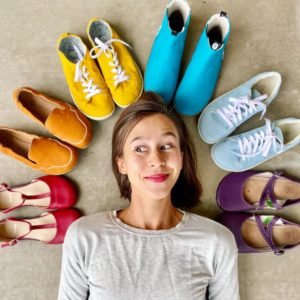

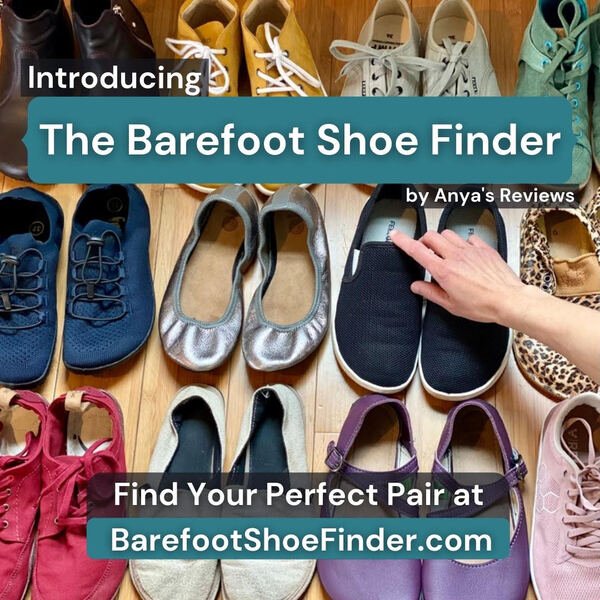
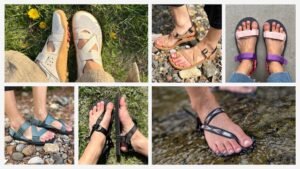
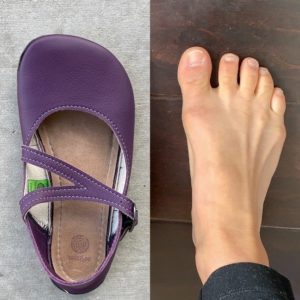

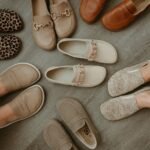
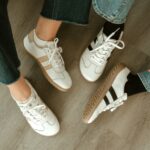

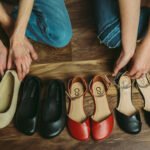


16 thoughts on “Who Shouldn’t Wear Barefoot Shoes?”
Why are you including peripheral neuropathy? I have that and love foot shaled shoes. I am wearing LEMs since they have more cushioning then most barefoot shoes. I have added a thin layer of additional cushioning for walking outside and so far, so good! I have been wearing the LEMs for at least 9 months and just added the additional cushioning a week ago. It’s impossible to find foot shaped shoes and we know the most important things in a good shoe are flexible, lightweight, but most importantly, foot shaped. Even the wider toe boxes of regular shoes are bunion makers. That is where it starts. And the little toes are so important because they help us balance. All the toes help balance. I am amazed at how many of my reflexology clients cannot spread their toes wide, especially the little toe. And we need this for better balance as we age.
I think that clinicians really hesitate to recommend barefoot shoes to someone with peripheral neuropathy without being able to see them in person. But you’re totally right, choosing a foot shaped shoe with cushioning can really give you so much benefit while being far less risky.
I am with you. I have peripheral neuropathy as well. Barefoot shoes allow me to use my entire foot to help keep my balance. Also, the message being sent from my feet to my brain is that my nerves need repaired. My neurologist and physical therapist have both said that they have heard this before from other patients.
I agree… I have idiopathic neuropathy… very poor balance but no pain…. keeps me closer to the ground and light weight…age 78
So I have peripheral neuropathy from a stroke. I absolutely need something desperately. Please give an ideaog beast shoe. Thanks so much.
I agree 100% with Angela. I have CIPN. I do not have pain, but the numbness affects my balance immensely. Barefoot shoes allow me to feel uneven surfaces, especially with my toes, like gravel or uneven grassy surfaces to make me more stable. If I wear boots or shoes with a thicker sole or platform, the blocks I feel I am already walking on are exacerbated.
I thought I remembered a post where you had stated that you were hypermobile. Did you just take your time breaking them in while working on foot strength and balance? Hypermobile Ehlers Danlos woman here, lol. My feet are wide and I have found a lot more comfort in the wide toe box shoes that barefoot brands have to offer. Would we need to be a lot more careful? I haven’t found a knowledgeable enough clinician near me that can even talk with me about comorbidities let alone barefoot shoes.
Hi Cate, Yes I had to approach barefoot shoes slowly and carefully. I used my orthotics inside my barefoot shoe for some time while I built up strength, and to this day I keep some cushioned options around for bad days/long hikes, etc. There is not standardized approach, everyone will experience it differently. But in general it seems like people with hypermobility should be paying extra attention to signals from their body when they try minimal shoes, and not be afraid to backtrack or modify as needed.
I have Peripheral Neuropathy. I do not have Diabetes and do not have shooting pains. I have dead feet that ache at night and keep me awake. I also have very high arches and very narrow, boney feet. I have seen several podiatrists and as a result have had several pair of arch supports. My arches have collapsed more and more and my ankles and knees have turned in to counteract this. My walking gait is getting worse. I am doing Block Therapy in an effort to move the facia in my legs and feet. Should I give barefoot shoes a try?
I would at least give wide toe box shoes a try, but I really can’t say how you’ll respond to barefoot shoes. Have you ever tried stimulating the nerves in your feet? There is a lot of really interesting research about how those nerves help with posture and gait, so experimenting (safely) with texture and foot wiping might help. In this email newsletter that I sent out yesterday I linked to Naboso Technology and a podcast that talks about foot wiping (it’s after the wedding shoe section). That is something you could explore.
Our senior fitness has a vibration platform…. I use it 20 minutes 4 times a week for my neuropathy…it stimulates the nerves and increases circulation in your feet and legs …into week 10 with very little change so far but I am sticking with it…age 78
Try Altra brand and then barefoot brands after wearing Altra for awhile. You can get Altra online or at REI.
Complete rubbish about not for peripheral neuropathy.
Please don’t spread nonsense.
People will believe you!
The text says that those groups should consider working with a professional, not that they should never wear barefoot shoes or won’t benefit from them! That continues to be my stance. Because of the risk of wounds going unnoticed in people with peripheral neuropathy, extra care is needed.
I like your response because too many people see products on the Internet along with positive customer testimonials and decide that a miracle product will resolve their issues. Your response regarding peripheral neuropathy is a responsible one. I am intrigued by this product because I have peripheral neuropathy and also radiculopathy. My balance is slowly getting worse. However, because it is painful for me to go barefoot — except on carpet — I am hesitant to wear a shoe without very good cushioning.
I just got a pair of Barefoot shoes & upon putting them on for the first time I felt like dancing. Nothing at all has helped my PN – except Lyrica & LDN for pain but nothing for numbness & stiffness. After suffering for 15 years I’m looking forward to what Barefoot shoes can bring.